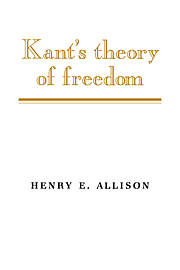Book contents
- Frontmatter
- Contents
- Acknowledgments
- Note on sources and key to abbreviations and translations
- Introduction
- Part I Freedom and rational agency in the Critique of Pure Reason
- Part II Moral agency and moral psychology
- Part III The justification of morality and freedom
- 11 The Reciprocity Thesis
- 12 The deduction in Groundwork III
- 13 The fact of reason and the deduction of freedom
- Notes
- Bibliography
- Index
12 - The deduction in Groundwork III
Published online by Cambridge University Press: 05 June 2012
- Frontmatter
- Contents
- Acknowledgments
- Note on sources and key to abbreviations and translations
- Introduction
- Part I Freedom and rational agency in the Critique of Pure Reason
- Part II Moral agency and moral psychology
- Part III The justification of morality and freedom
- 11 The Reciprocity Thesis
- 12 The deduction in Groundwork III
- 13 The fact of reason and the deduction of freedom
- Notes
- Bibliography
- Index
Summary
The third part of the Groundwork, which is entitled “Passage from a Metaphysic of Morals to a Critique of Pure Practical Reason,” is one of the most enigmatic of the Kantian texts. It is clear that its chief purpose is to ground or justify the “supreme principle of morality” articulated in the first two parts, and it would appear that Kant took this to require a deduction, presumably modeled on the transcendental deduction of the categories in the first Critique. Nevertheless, although there is virtual unanimity that the attempt fails, there is little agreement concerning the actual structure of the argument that Kant advances. In fact, it is not clear whether the deduction is of the moral law, the categorical imperative, freedom, all three; or even whether it can be properly characterized as a “deduction” at all.
In the present chapter I shall argue that Groundwork III does contain a deduction (albeit one that is seriously flawed) of the moral law and that the Reciprocity Thesis is its first premise or, better, underlying presupposition. The chapter is divided into four parts. The first analyzes the much-discussed “preparatory” argument, which is compressed into a single dense paragraph and which, as the caption indicates, is intended to show that “Freedom Must be Presupposed as a Property of the Will of all Rational Beings” (Gr 4: 447; 115).
- Type
- Chapter
- Information
- Kant's Theory of Freedom , pp. 214 - 229Publisher: Cambridge University PressPrint publication year: 1990
- 1
- Cited by



